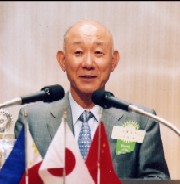��Membership and Extension Month��
Meeting
��To welcome our abundant twilight years��
August 1, 2007
Mr. Nobuo Otsuka,
President,
Oume Keiyu Hospital
 ��I am a psychiatrist graduated from the School of Medicine, Keio University. From the autumn of 1970, I studied in France for 2 years under a scholarship granted by the Government of France and studied psychopathology. In the spring of the year after I returned from France, I received a consultation from my friend with respect to an elderly person, and this was the first time I became aware of the existence of elderly hospitals. The hospital I visited was more like a sanatorium to spend the last 3 months of life as a punishment for having enjoyed longevity than a hospital. I am disappointed if the only option for me would be to place my aging parents in such facilities instead of nursing my parents and wife��s parents. I decided, at that time, that I would build a facility where I can be comfortable in placing the elderly.
��I am a psychiatrist graduated from the School of Medicine, Keio University. From the autumn of 1970, I studied in France for 2 years under a scholarship granted by the Government of France and studied psychopathology. In the spring of the year after I returned from France, I received a consultation from my friend with respect to an elderly person, and this was the first time I became aware of the existence of elderly hospitals. The hospital I visited was more like a sanatorium to spend the last 3 months of life as a punishment for having enjoyed longevity than a hospital. I am disappointed if the only option for me would be to place my aging parents in such facilities instead of nursing my parents and wife��s parents. I decided, at that time, that I would build a facility where I can be comfortable in placing the elderly.
1. Summary of the Project
In February 1980, I opened the Oume Keiyu Hospital (147 beds). There were many who wanted to be admitted and gradually it was expanded to the current 736 bed facility. Based on a request from ��Yomiuri Land��, I opened a new hospital ��Yomiuri Land Keiyu Hospital�� (240 beds) in April 2005 in the corner of the 160,000 tsubo amusement park. The two hospitals together provide roughly 1,000 beds with staffing at Oume totaling 780 and at Yomiuri 300.
��The average age of the patients is 85 with the oldest being 106 and there are roughly 30 who are over 100 years old. One third of the patients are confined to their beds. Roughly 70% of the patients have to wear diapers throughout the day. 70-80% of the patients suffer from dementia. Patients with terminal cancer or terminal psychoneurosis account for one quarter of all patients.
2. The Future of Japan��s Aging Society
��When we think about old age, we think first of all of the future state of social security such as pensions, nursing care, and medical care. The underlying assumptions of the Japanese social security system are that the next generation will continue to increase absolutely, and that the economy would continue to grow at a pace of 5-6% or more per year. If these two assumptions were violated, it is hard to conceive the continuation of the current system.
��The government��s thinking is that the core that supports the aging society is nursing care delivered at home, and the insurance system that supports home nursing care and businesses that support this have been started. After several years, the companies that are undertaking the nursing care business nationally have been subjected to severe audits and have been effectively shut down.
��The background to this incident lies in the setting of prices for home nursing care at a lower level than that of nursing care given at nursing-care facilities. As a result, the business entities forced hard working conditions on the nursing caregivers. The businesses were forced to tinker with the standards that had been established. This incident depicts the necessity for a review of the basic policy that centers on home nursing care and that relies totally on the private sector.
3. Preparing for the twilight years
All systems in Japan covering medical care and nursing care for the aged are all public. The standards of service, the format and quantity are all set by the national government. As it is defined across the board nationwide, it cannot be completely satisfactory. A seniors�� facility where the three functions of lifestyle, nursing care, and medical care are provided is a rarity. When looking over a facility, it is important to ascertain what kind of medical care it has.
��Let us turn our attention to preparing for the twilight years. There is a phrase, ��busiest at the last moments��. It means that when coming to the last days of one��s life, they are busy as there are so many things to be done.
��First is sorting out their own affairs. The sorting of items of value and a list of contacts for unlikely events need to be prepared. Being fully prepared is the secret for long life. Second is contributing to society. Giving to society is truly the proof of being alive. When the body no longer responds, appreciation to those around you is giving to society. When one finally has to seek nursing care, it should not be left to amateurs, but to the professionals. Nursing care requires not only the feeling of caring, but also requires techniques and knowledge and structure.
��I have seen many who greeted the end of their lives. If the structure of nursing care can be skillfully created, dying in style can become a reality. When I retire from active practice, I will tour touting my interpretation of dying in style and create a society of dying in style with my compatriots. At that time, I will ask for your active participation.